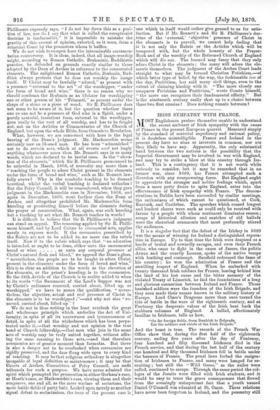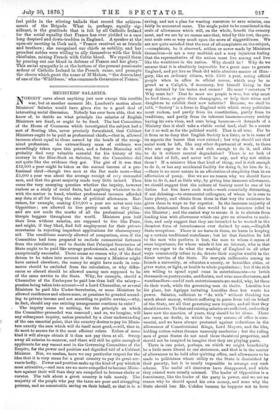IRISH SYMPATHY WITH FRANCE.
1/OST Englishmen profess themselve unable to understand the recent outburst of Irish sympathy with the cause
of France in the present European quarrel. Measured simply by the standard of material expediency and rational policy, it is doubtless unintelligible. France and Ireland in the present day have no aims or interests in common, nor are they likely to have any. Apparently, the only substantial bond between the two nations is the possibility that the Imperial Government may be involved in war with England, and may try to strike a blow at this country through Ire- land. This is a contingency that it is not worth while seriously to consider, but it may be remarked that in no former war, since 1689, has France attempted such a diversion with any overpowering force. But England ought to appreciate the stronger and nobler feelings which, apart from a mere petty desire to spite England, enter into the effervescence of Irish sympathy with France. The demon- strations in Dublin have been succeeded by similar meetings, the enthusiasm of which cannot be questioned, at Cork, Kanturk, and Castlebar. The speeches which roused longest and loudest cheers were such as could only be received with favour by a people with whom sentiment dominates reason ; scraps of historical allusion and snatches of old ballads were the rhetorical ornaments that most profoundly stirred the audiences.
It is a singular fact that the defeat of the Irishry in 1689 was the means of winning for Ireland a distinguished reputa- tion in Europe. Up to that time the Irish were despised as a horde of brutal and cowardly savages, and even their French allies, who came to fight in the cause of ,Tames, the politic Avaux and the courtly Lauzun, spoke of the native troops with loathing and contempt. Sarsfield redeemed the fame of his country ; he won the admiration of France and the unwilling respect of England. When he embarked with twenty thousand Irish soldiers for France, leaving behind him the land of his lost cause and the bitter memory of the violated Treaty of Limerick, he laid the foundations of a long and glorious connection between Ireland and France. Those banished soldiers were the founders of the Irish Brigade, and they soon made their names known in the military history of Europe. Lord Clare's Dragoons more than once turned the tide of battle in the wars of the eighteenth century, and at Fontenoy the desperate valour of the Irish beat back the stubborn columns of England. A ballad, affectionately familiar to Irishmen, tells us how,
"On far foreign fields, from Dankirk to Belgrade, Lie the soldiers and chiefs of the Irish Brigade."
And the boast is true. The records of the French War Office show that, during the first half of the eighteenth century, ending five years after the day of Fontenoy, four hundred and fifty thousand Irishmen died in the French service, and that during the last half of the century one hundred and fifty thousand Irishmen fell in battle under the banners of France. The penal laws forbad the emigra- tion of Irishmen to France, and many were hanged for re- cruiting ; but still the " Wild Geese," as the exiles were called, continued to escape. Through the same period the col- leges of the Jesuits were filled with Irish students, and it would be easy to trace the grave consequences that flowed from the seemingly unimportant fact that a youth named Daniel O'Connell was educated at St. Omer. These relations have never been forgotten in Ireland, and the peasantry still
feel pride in the stirring ballads that record the achieve- ments of the Brigade. What is, perhaps, equally sig- nificant, is the gratitude that is felt by all Catholic Ireland for the social equality that France has ever yielded to a race long despised and down-trodden in England. A speaker at the open-air meeting in Cork said, "France received us as friends and brothers ; she recognized our chiefs as nobility, and her proudest nobles were willing to ally themselves with the Irish chieftains, mixing French with Celtic blood. We repaid them by pouring out our blood in defence of France and her glory." This social sympathy is at the bottom of the present passionate ardour of Catholic Ireland in the French cause, and prompts the cheers which greet the name of AMahon, " the descendant of one of the 'Wild Geese,' who commands the armies of France."































 Previous page
Previous page